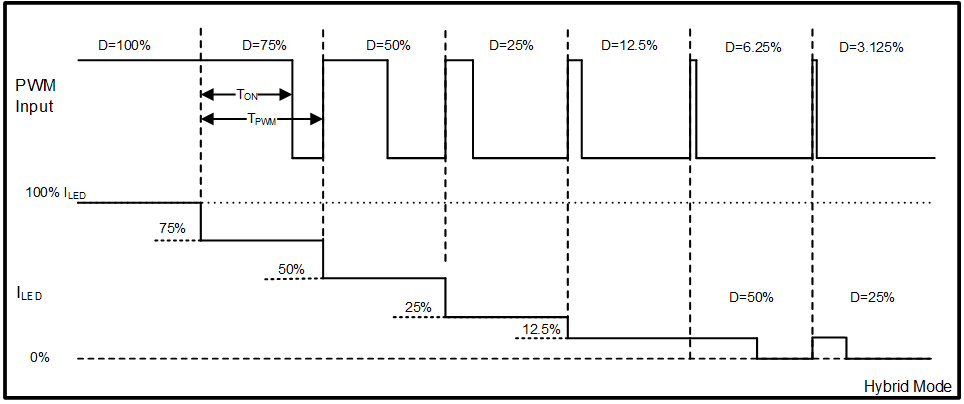SLVSH05 November 2023 LP8865U-Q1 , LP8865V-Q1 , LP8865W-Q1 , LP8865X-Q1 , LP8865Y-Q1 , LP8865Z-Q1
PRODUCTION DATA
- 1
- 1 Features
- 2 Applications
- 3 Description
- 4 Comparison Table
- 5 Pin Configuration and Functions
- 6 Specifications
- 7 Detailed Description
-
8 Application and Implementation
- 8.1 Application Information
- 8.2 Typical Application
- 8.3 Power Supply Recommendations
- 8.4 Layout
- 9 Device and Documentation Support
- 10Revision History
- 11Mechanical, Packaging, and Orderable Information
パッケージ・オプション
メカニカル・データ(パッケージ|ピン)
- DMT|14
サーマルパッド・メカニカル・データ
- DMT|14
発注情報
7.3.4.3 Hybrid Dimming
The LP8865 family supports a unique hybid dimming function to maximize the dimming performance, especially when both high dimming frequency and high dimming ratio are needed. The hybrid dimming mode is enabled when the ADIM/HD pin is always low and the PWM/EN pin is configured by a PWM input signal.
When the hybrid dimming is enabled, the LED current is regulated by the analog dimming at high brightness level (12.5% - 100%) and by the PWM dimming at low brightness level (0% - 12.5%), respectively. At high brightness level, the internal voltage reference, VREF, changes in proportion to the duty cycle of the PWM input signal at the PWM/EN pin. At low brightness level, VREF stays unchanged and an internal PWM generator is enabled. Thus, the LED is turned on and off corresponding to the on and off of the internal PWM signal of which the frequency and the duty cycle are configured by the PWM input signal at the PWM/EN pin. The detailed hybrid dimming behavior is illustrated in the below figure.
 Figure 7-3 Hybrid Dimming
Figure 7-3 Hybrid Dimming